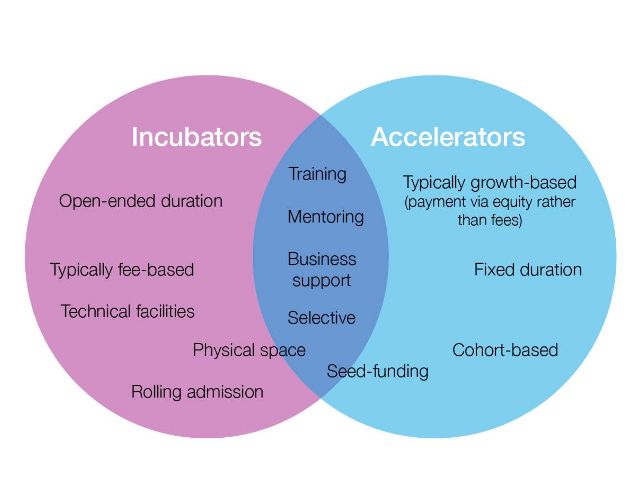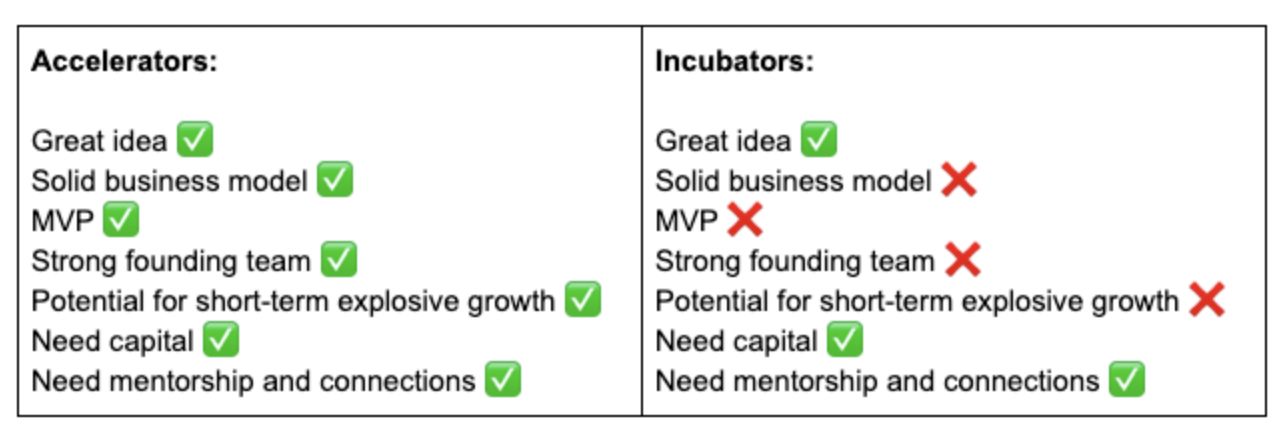Business incubators and accelerators: do you need them?
Do you have an urge to become an entrepreneur? (You might want to analyse your entrepreneurial potential here). That's a great start! For everything else, there's Elona, the AI startup co-founder for you! As your AI co-founder, Elona delivers a powerful combination of expertise, support, and motivation to help you conquer the world of startups.
Every business needs capital to grow, but most entrepreneurs have limited energy and time reserves. Everyone wants to make sure that by choosing one type of financing or another they end up with access to the best connections and opportunities. So where to start?
The dream of any startup is to be accepted into a top-tier program and have the opportunity to pitch to the most prominent investors. Is that the right dream to follow? Well, that's a question for a different article. For now, let's concentrate on figuring out how to do due diligence on an incubator or an accelerator and what the difference between the two is.
5 Important Things To Pay Attention To When Choosing An Incubator
1) Location - It’s important to consider where an incubator is located when choosing one since this will determine how accessible it is for you as well as what type of resources it has available locally (e.g., talent pool). Some programs are run online these days, which also has its pros and cons. On one hand, you don't have to move anywhere and can study/work out of the comfort of your own home/office. On the other, networking works better offline.
2) Services Offered - Different incubator programs offer different services so it’s important to evaluate what each one offers before making a decision (e .g., mentorship, office space). Once you have researched several incubators, you will see that the offering is more or less similar. The curriculum is going to be the same and it is mostly aimed at first time founders who don't even know the basics. The difference may be in the quality of mentor and investor network, funding opportunities, etc.
3) Cost - Some incubator programs require fees while others are free so it’s important to consider your budget when making a decision about which one is right for you. Be careful with those that want equity from you. Don't sign any agreements until you have spoken to a startup lawyer!
4) Reputation - It’s important to research the incubator's reputation before committing since this will give you an indication of how successful its past participants have been. Find some alumni and ask them directly. Don't blindly believe testimonials on the website, especially if all of them are positive.
5) Network - It's also important to consider the network that an incubator provides since this will determine how much access you'll have to potential investors , customers , etc . Find out how many startups actually got funded thanks to the program.
We have a completely FREE STARTUP SCHOOL and there's a new AI FOR STARTUPS MODULE run by AI. Sign up for the free startup school and get started immediately.
The Process Of Applying To An Incubator
The process of applying for an incubator program varies depending on the program but generally involves submitting an application form with information about your startup including its mission statement , business plan , team members , etc . Be very cautious with incoming messages that say that you were pre-selected or even selected without you ever applying. That's what Newchip Accelerator did and it didn't end well for all the startups.
Once your application has been reviewed , you may then be invited for an interview where you'll need to present your ideas further . After this stage , if successful , you'll receive confirmation that you've been accepted into the program . From there , you'll need to follow any instructions given by the program regarding next steps such as signing agreements or paying fees (if applicable ) . Finally , once all paperwork has been completed , you'll officially become part of the program !
Looking to apply for EU Funding? Check out the article on writing a successful application here.
Let’s take a look at key aspects of startup accelerators and incubators in Europe.
Accelerators
According to Harvard Business Review, startup accelerators support early-stage, growth-driven companies through education, mentorship, and financing. Startups enter accelerators for a fixed period of time and as part of a cohort of companies. The accelerator experience is a process of intense, rapid, and immersive education aimed at accelerating the life cycle of young innovative companies, compressing years worth of learning-by-doing into just a few months.
The key unique features that make accelerators stand out are that they are fixed-term, cohort-based, mentoring-oriented, and include a "demo day" for graduates – a day when startups pitch their ideas to raise first big funding.
Apart from educational services, your other benefits include:
- Support from mentors, investors, and potential partners.
- Valuable experience. The very process of filling out an application can teach you a lot.
- Database of useful contacts.
- A chance to get a look at how things work in the industry.
- Additional PR.
Do you want to test your startup journey without risking to fail in real life and learn essential startup knowledge, apply for Fe/male Switch startup game for women and build your virtual startup, play, learn and fail in the game to make it right in the reality.
Assuming your startup is at its early stage, the accelerator environment can become a business community of like-minded people and help you form a good networking circle to make friends, gain new knowledge, and learn from each other’s success.
It’s worth saying that accelerators tend to focus on small teams rather than individual founders. To participate in most accelerators, you need a team that has already been formed. If you do not have enough like-minded people, it’s better to give your attention to startup incubators.
Additionally, the selection of participants can be pretty tough! While the application process is open to all, it can be highly competitive. For example, the competition in Techstars sometimes reaches 1,000 applications per seat, and less than 1% of the applications are selected.
Unfortunately, accelerators rarely give out large sums of money. More often than not, the funding is enough for the time of the program testing several business hypotheses, creating MVPs, and finding the first clients.
Let’s take a look at examples of the best startup accelerators in Europe, as well as startup accelerators in the Netherlands.
Here you can find information on the top 17 startup accelerators in Europe, including general information about each program, program durations, investment sizes, among other things.
Here’s the list of the Netherlands’ top 9 startup accelerators.
Read on to learn about better alternatives to accelerators.
Incubators
Before we compare the two, let’s speak about incubators. According to the US Chamber of Commerce, a startup incubator is a collaborative program for startup companies — usually physically located in one central workspace — designed to help startups in their infancy succeed by providing workspace, seed funding, mentoring and training.
Startup incubators are usually nonprofit organizations, often associated with universities and business schools that extend invitations to students, alumni, and members of the community to take advantage of the program.
What are the benefits?
Apart from an office, educational services and funding, a business incubator helps the entrepreneur communicate with official bodies, arranges business consultations (law, IP rights, taxes, etc.), assists in attracting investment, helps with advertising, branding and organization of events. Most importantly, incubators help attract sources of financing (grants from special funds).
Top 10 Incubators In Europe:
1) Startup Wise Guys – Estonia & Lithuania
2) Seedcamp – UK & Europe
3) Techstars – UK & Europe
4) Wayra – Spain & Portugal
5) Microsoft Ventures – UK & Europe
6) Entrepreneur First – UK & Europe
7) Startupbootcamp – UK & Europe
8 ) Antler – Sweden & Norway
9 ) Orange Fab – France
10 ) Axel Springer Plug And Play– Germany
Here you can find more information on the top startup incubators in Europe, including general information about each program, program durations, investment sizes, and other things.
Here’s the list of the Netherlands’ top startup incubators. These lists also include accelerators and VCs.
So what’s the difference?
Business incubators and accelerators are programs designed to help entrepreneurs launch their businesses. They provide mentorship, resources, and support to help startups grow. The main difference between the two is that incubators provide longer-term assistance while accelerators focus on shorter-term growth. Business incubators are typically funded by government or private organizations, while accelerators are usually run by venture capitalists or angel investors. Both types of programs offer a variety of services such as access to mentors, networking opportunities, office space, and funding.

According to MassChallenge, startup incubators help entrepreneurs refine business ideas and build their company from the ground up.
Startup accelerators “provide early-stage companies that already have a minimum viable product (MVP) with the education, resources, and mentorship needed to promote what might otherwise be several slow years of growth into a few short months.”
MassСhallenge provides a great summary of both types to help you choose:

Keep in mind that while accelerators and incubators are very successful in helping startups succeed and gain recognition, getting into these programs is no guarantee of success for the startup founder and does not guarantee reliable investment for the startup.
Advantages of Business Incubators and Accelerators:
1. Access to Mentors: One of the biggest advantages of business incubator and accelerator programs is the access they provide to experienced mentors who can provide valuable advice on how to succeed in business.
2. Networking Opportunities: These programs also offer networking opportunities with other entrepreneurs and potential investors who can help you get your business off the ground.
3. Office Space: Many incubator and accelerator programs provide office space for startups so they don’t have to worry about finding a place to work from.
4. Funding: Some programs also offer funding for startups so they don’t have to worry about financing their businesses themselves.
5. Resources: These programs often provide resources such as legal advice, marketing materials, and more that can be invaluable for startups trying to get off the ground quickly.
Drawbacks of Business Incubators and Accelerators:
1. Cost: While some incubator or accelerator programs may be free or low cost, many require a significant investment in order to participate in them which may not be feasible for some entrepreneurs depending on their financial situation.
2. Time Commitment: Participating in an incubator or accelerator program requires a significant time commitment which may not be feasible for some entrepreneurs depending on their current commitments or lifestyle choices..
3. Location: Many incubator and accelerator programs are located in specific cities or regions which means that entrepreneurs must relocate if they want to participate in them which can be difficult if they already have established roots elsewhere..
4. Competition: There is often fierce competition among participants in these types of programs which can make it difficult for some entrepreneurs to stand out from the crowd..
5 .Expectations : Many incubator and accelerator programs have high expectations from participants which can be difficult for some entrepreneurs who may not have experience running a business before.
What can be better than incubators and accelerators?
But what can be better than incubators and accelerators? A game where you can learn, communicate and have fun while getting all the same value that incubators give and even more. See for yourself what Fe/male Switch has to offer:
Extensive cutting edge startup knowledge base: startup building essentials, digital tools, marketing, strategy, confidence, being a CEO, tech/digital skills, blockchain, metaverse, AI, NFTs, pitching, budget planning, working with sponsors, building your own website, building your own community, building your own app, working with mentors, networking, investing, collaboration, project management, start-up idea generation and validation, organizational skills, legal knowledge, no-coding, designing, etc.
Female mentors to support your startup journey, female investors to introduce you to building relationships with investors, practical workshops with industry professionals where you will build your own app, step-by-step guidance to startup building, work in teams like in a real startup with an opportunity to find your co-founder and employees, live sessions with experienced female CEOs and startup founders as your role model, supportive female community,
You can play the game as a startup founder, co-founder, a mentor, or an investor.
You can build your own app, figure out your legal and marketing, strategy get software development advise/services from the F/MS experts, and of course emotional support during “wine sessions” and a lot more.
Apply for the official launch of the game and build your startup! Don't wanna wait and want to start learning now? Join our Startup School and get access to our knowledge base.
Good luck!


